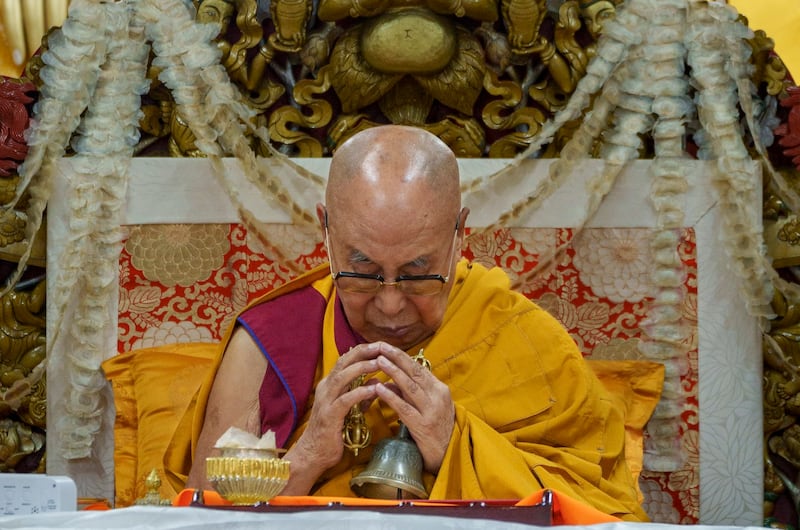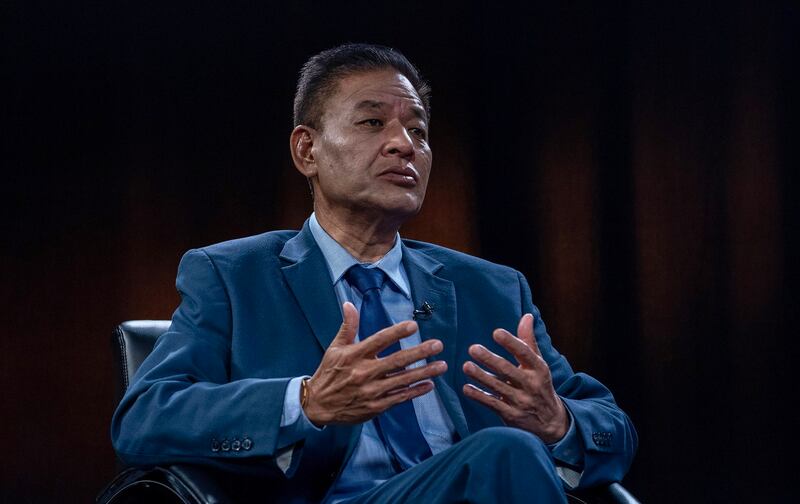As the fight over a speaker for the U.S. House of Representatives shows, even established democratic institutions have struggled to find consensus recently.
The Tibetan exile community’s experience with representative government is fresher, but it too is showing signs of strain, with potential implications for what may happen to the Tibet freedom movement without the Dalai Lama’s guiding hand.
Last month, a session of Parliament scheduled to last nine days ended after just three when a group of lawmakers walked out over an allegation one of them had met with a Chinese official at a luxury hotel in West Bengal.
The dispute has little immediate impact on the lives of the members of the diaspora, who remain governed by the laws of the countries they live in. An executive branch known as the Central Tibetan Administration in Dharamsala, India – overseen by an elected political leader, or sikyong – continues to administer services to the country's refugee settlements.
But the split in the 45-member Parliament highlights uncomfortable questions about the community’s ability to maintain its cohesion without the Dalai Lama. The Tibetan spiritual leader retired from politics in 2011 in order to promote democracy among the diaspora. But as he approaches 90, worries about political disagreements have gained new urgency.
The stalemate "is a real symptom of a deeper concern, which is the question of how unified the community is and is going to be going forward,” Allen Carlson, the director of Cornell University’s China and Asia Pacific Studies program, said in an interview.
Given the small size of their population and lack of global political power, exiled Tibetans need to maintain a united front as they try to negotiate for greater autonomy for their homeland with the Chinese government – efforts that even with the attention the Dalai Lama can draw have been at a standstill for more than a decade.
“If there’s a sense of deep divisions within the diaspora, then that probably makes them weaker,” Carlson said. Without the unifying force of the Dalai Lama, though, “I think you’re going to see more and more of these sorts of splits,” he said.
A question of succession
Overhanging the recent dispute are questions about who will succeed the Dalai Lama after his death.
The 88-year-old Tenzin Gyatso, who is the 14th Dalai Lama, has indicated that he’ll choose the manner in which his spirit is reborn, though he says he may live for another two decades.
But the Chinese Communist Party, while officially atheist, has nevertheless granted itself the power to approve a successor. Critics say China wants to install a more compliant Buddhist leader to better assimilate what has been a historically restive region.

In March 1959, the Chinese army put down unrest in Lhasa, which forced Tenzin Gyatso and tens of thousands of other Tibetans to flee to India, Nepal and Bhutan. India offered an old British outpost in the Himalayas for resettlement, and gradually the components of a government-in-exile grew up there.
The exile government now administers a $45 million budget raised by donations from the diaspora and foreign aid from countries like the United States. Its executive, legislative and judicial branches mimic Western governments and represent a shift away from Tibet's historic feudal theocracy. That enables easy contrasts with China's increasing authoritarianism and a framework for a future Tibet, should it ever achieve independence.
"It is to benefit Tibetans in the long run," the Dalai Lama said in announcing his retirement. "The world belongs to the people. So, to govern the country, the best way is the democratic system, through elections."
But the Dalai Lama, who won the Nobel Peace Prize in 1989, remains by far the most recognized advocate for Tibetan freedom.
Even at 88, his stature and charisma are a powerful unifying force for the more than 6 million Tibetans who remain in China and the 130,000 or so who live outside of the country. So much so, that it is a crime in China to possess his photograph, and religious leaders in Tibet are coerced by the Chinese government to renounce him.
The walk-out
The unicameral Parliament meets in September and March each year. Lawmakers, who are elected for five-year terms, approve kalons, or cabinet ministers, review the government's budget, and support programs designed to preserve Tibetan culture, language and religion.
This session’s trouble started shortly after it began when a group representing the body’s religious constituency and one of three historic Tibet geographic regions walked out, preventing a quorum.
The group demanded that one member, Geshe Monlam Tharchin, be absolved of any suspicion surrounding the alleged meeting with the Chinese official. Given China’s repressive policies toward Tibet, it is a charged accusation, but it isn’t clear whether the meeting took place, and if it did, what was the purpose. Geshe Monlam Tharchin denied in Parliament that the meeting happened.
The religious constituency refers to members elected to seats reserved for representatives from the four schools of Tibetan Buddhism – Nyingma, Kagyu, Sakya and Gelugs – and Yungdrung Bon, a religious practice that predates Buddhism.
Ten seats are also reserved for each of Tibet’s historic regions: U-Tsang, Dhomey and Dhotoe, members from which joined the religious constituency in the walk out. The remaining seats are filled by representatives from North America, Europe and Australia and Asia not including Nepal, Bhutan and India.
Gyari Dolma, the exile government’s security minister, told reporters that she could not say when an investigation into the charge against Geshe Monlam Tharchin would be completed, as it depended on the cooperation of witnesses.
It is uncertain if the Parliament will meet again before the March budget session. When an RFA reporter approached Monlam Tharchin to ask if the session would continue, he just waved his hand without comment.
Rising frustration
As with other democracies – including the United States, where a sizable portion of the electorate believes President Biden didn't win in 2020 – disagreements within the exile government have sharpened in recent years. (Disagreements within authoritarian governments are harder to track.)
In 2021, newly elected parliamentarians fought over the manner in which they would be sworn in. The impasse lasted for four months and was only resolved when the Dalai Lama, by then retired for a decade, intervened.
That fight was related to an earlier move by the Parliament to remove with little notice the three justices who make up the exile government’s highest court. The subject of the court and the qualifications of justices were among the issues this Parliament was meant to address this session.

A call for unity
Outside of Parliament, there are signs of a broader fraying within the diaspora itself over whether the goal should be true independence from China for Tibet, pushed by younger exiles, and a so-called “middle way” that calls for Tibet to remain a part of China but with far greater autonomy. The latter position is promoted by the Dalai Lama and the current sikyong, Penpa Tsering.
An additional complication is an ongoing population loss in Dharamsala. Thousands of exiles have left for countries like the United States that offer better economic prospects, creating a geographic fracture in addition to the emerging political cracks.
On a visit to Washington, D.C., last week – part of a tour of the Americas to build support for the Tibet freedom movement – Penpa Tsering said Tibetans needed to remain united. The focus, he said, should remain on China and its repressive policies.
“There’s no need to fight amongst ourselves,” Penpa Tsering, elected to the office in 2021, said during an Oct. 19 interview with RFA Tibetan in Washington. “We’re only 130,000 Tibetans in exile, so there’s no need to disperse our strength.”
Translated by Tenzin Dicky and edited by Abby Seiff.
